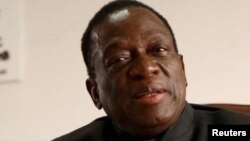Attending his first international conference since replacing former president Robert Mugabe through a military action, Zimbabwe President Emmerson Mnangagwa has not only put a new face to the leadership of the country, but a new message as well – that Zimbabwe is open for business, and to foreign observers interested in overseeing the upcoming elections.
In a wide ranging interview with BBC journalist Mishal Husain during the World Economic Forum in Davos, Wednesday, President Mnangagwa sounded a different tune on an area that contributed to various countries, including the United States, placing targeted sanctions on Zimbabwe – elections - which he said will be held before July.
"This time around Zimbabwe is open and transparent. We want to have free, fair, credible elections, free of violence. If you have that criteria, why would you want to deny international observers coming into our country?" queried the 75-year-old president.
Under the 37-year leadership of former President Mugabe, observers from most western countries such as the U.S., Britain and others in the European Union, were denied permission to observe elections, over allegations of bias, leaving that responsibility to mostly African nations or countries considered more sympathetic to Zimbabwe.
Unlike his predecessor Mugabe who reportedly lost the 2008 elections to opposition leader Morgan Tsvangirai of the Movement for Democratic Change, but refused to leave office, Mnangagwa said he would leave if the electorate rejected him and his party.
“If we lose the elections, that’s it,” said Mnangagwa. “Whichever party wins the election will proceed to take the reigns of power.”
The country’s business climate, also seen as unwelcoming to foreign investors due to an indigenization policy that limited foreign ownership of companies to 49%, is another area that Mnangagwa has used to distinguish himself from his predecessor, who seldom hid his contempt for what he called, “western imperialists.”
Unlike many African leaders who have spoken against U.S. President Donald Trump because of his recent reference of African nations as “shithole countries,” Mnangagwa said if he had the opportunity to meet President Trump in Davos, he would personally invite him to invest in Zimbabwe, which he said is now “open for business.”
“If Trump came here, today and I’m still around, I’ll be able to talk to him, I’ll be able to make request from him and say, oh, Mr. President, Zimbabwe is open for business. I know Americans like to play golf, come and build golf courses at Victoria Falls, build hotels, and we’ll give you incentives, 5% incentives to do all those things,” he said, adding, “we are open.”
Gukurahundi
As in previous interviews he’s given since his inauguration, Mnangagwa skirted around the controversial issue of Gukurahundi, the killings pinned on the North Korean 5th Brigade in the 1980s in the Matabeleland and Midlands provinces, that claimed the lives of more than 20,000 people. During the time, Mnangagwa servced as the state security minister, and many accuse him of complicity in the killings.
Mnangagwa disputed the numbers and said the issue was being addressed nationally.




